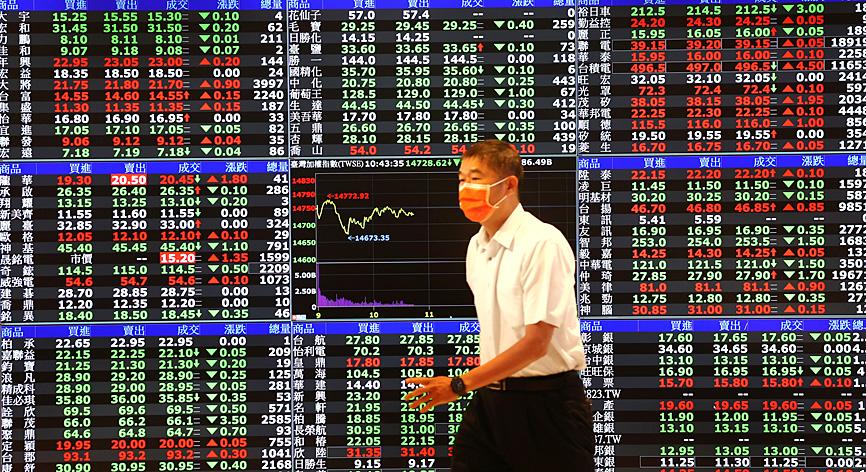The TAIEX yesterday rose 0.2 percent to close at 14,777.02 points after falling in the two previous sessions amid rising tensions across the Taiwan Strait.
However, turnover fell to NT$174.809 billion (US$5.83 billion), as most investors retreated to the sidelines amid US House of Representatives Speaker Nancy Pelosi’s visit to Taiwan.
Foreign institutional investors sold a net NT$6.12 billion of shares on the main board, compared with NT$19.66 billion net sold on Tuesday, Taiwan Stock Exchange (TWSE) data showed.

Photo: CNA
“Political issues were the main reason why transaction shrank lately,” Hua Nan Securities Investment Management Co (華南投顧) chairman David Chu (儲祥生) said by telephone.
Investors would observe the effects of China’s retaliatory measures and see if more Taiwan-made products would be banned from the Chinese market, Chu said.
The National Stabilization Fund is also expected to lend support to the market in the near term, he said.
The Chinese customs agency on Monday night banned the imports of more than 100 Taiwanese food brands. Beijing yesterday also banned imports of fruit and fish from Taiwan, and suspended exports of natural sand to Taiwan.
“Judging from the gains posted by semiconductor heavyweights, I suspected the stabilization fund entered the market to bolster market confidence amid worries over tensions with China due to Pelosi’s visit,” Concord Securities Co (康和證券) analyst Kerry Huang (黃志祺) said.
The NT$500 billion fund was on July 12 authorized to intervene in the equity market to serve as a buffer against unexpected external factors that might disrupt market movement.
“Many investors appeared reluctant to chase prices for the moment, as they continued to watch the impact from Pelosi’s visit,” Huang said, referring to military exercises that China is set to begin today in waters around Taiwan.
In yesterday’s session, contract chipmaker Taiwan Semiconductor Manufacturing Co (TSMC, 台積電) was the target of some late-session buying, closing up 1.85 percent.
Led by TSMC, the electronics sector edged up 0.79 percent, with the semiconductor sub-index rising 1.73 percent.
The non-tech sector, especially food stocks, continued to show signs of weakness as China imposed more economic restrictions on Taiwan in response to Pelosi’s visit, and an industry association for Taiwanese bakeries said on Tuesday that it would seek the government’s help in accessing other foreign markets.

SEMICONDUCTORS: The German laser and plasma generator company will expand its local services as its specialized offerings support Taiwan’s semiconductor industries Trumpf SE + Co KG, a global leader in supplying laser technology and plasma generators used in chip production, is expanding its investments in Taiwan in an effort to deeply integrate into the global semiconductor supply chain in the pursuit of growth. The company, headquartered in Ditzingen, Germany, has invested significantly in a newly inaugurated regional technical center for plasma generators in Taoyuan, its latest expansion in Taiwan after being engaged in various industries for more than 25 years. The center, the first of its kind Trumpf built outside Germany, aims to serve customers from Taiwan, Japan, Southeast Asia and South Korea,

Gasoline and diesel prices at domestic fuel stations are to fall NT$0.2 per liter this week, down for a second consecutive week, CPC Corp, Taiwan (台灣中油) and Formosa Petrochemical Corp (台塑石化) announced yesterday. Effective today, gasoline prices at CPC and Formosa stations are to drop to NT$26.4, NT$27.9 and NT$29.9 per liter for 92, 95 and 98-octane unleaded gasoline respectively, the companies said in separate statements. The price of premium diesel is to fall to NT$24.8 per liter at CPC stations and NT$24.6 at Formosa pumps, they said. The price adjustments came even as international crude oil prices rose last week, as traders

SIZE MATTERS: TSMC started phasing out 8-inch wafer production last year, while Samsung is more aggressively retiring 8-inch capacity, TrendForce said Chipmakers are expected to raise prices of 8-inch wafers by up to 20 percent this year on concern over supply constraints as major contract chipmakers Taiwan Semiconductor Manufacturing Co (TSMC, 台積電) and Samsung Electronics Co gradually retire less advanced wafer capacity, TrendForce Corp (集邦科技) said yesterday. It is the first significant across-the-board price hike since a global semiconductor correction in 2023, the Taipei-based market researcher said in a report. Global 8-inch wafer capacity slid 0.3 percent year-on-year last year, although 8-inch wafer prices still hovered at relatively stable levels throughout the year, TrendForce said. The downward trend is expected to continue this year,

Taiwan Semiconductor Manufacturing Co (TSMC, 台積電), which supplies advanced chips to Nvidia Corp and Apple Inc, yesterday reported NT$1.046 trillion (US$33.1 billion) in revenue for last quarter, driven by constantly strong demand for artificial intelligence (AI) chips, falling in the upper end of its forecast. Based on TSMC’s financial guidance, revenue would expand about 22 percent sequentially to the range from US$32.2 billion to US$33.4 billion during the final quarter of 2024, it told investors in October last year. Last year in total, revenue jumped 31.61 percent to NT$3.81 trillion, compared with NT$2.89 trillion generated in the year before, according to